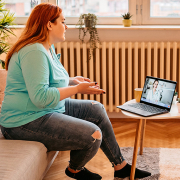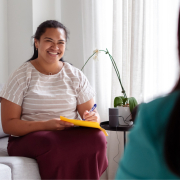How telehealth psychology sessions work and how to make the most of them
Seeing a psychologist is one of the best ways to support your mental health, especially if you’re going through a tough time.
Telehealth psychology, therapy and counselling sessions are a fantastic way to access the services you need, whilst offering you flexibility and convenience.
Here’s how telehealth psychology works, and how you can make sure you’re getting the most out of your telehealth sessions.
What is telehealth?
Telehealth is a term used to refer to any healthcare service that is delivered by technology, often remotely.
Telehealth appointments have been available for a long time, but their popularity has sky-rocketed over the past two years thanks to COVID-19.
In fact, almost 30% of Australians had a telehealth appointment in 2021, according to the Australian Bureau of Statistics.
The benefits of telehealth psychology sessions
During a telehealth appointment with a psychologist, you will get the same service you’d receive in a face-to-face session.
That doesn’t mean you won’t be nervous, and it’s completely normal to have apprehensions, but there’s a few things worth keeping in mind.
Over 80% of people surveyed as part of a report on telehealth services said their provider listened carefully, showed respect and spent enough time with them.
One study even found that telehealth services are more effective than normal in-person care, including mental health support services.
Here are some of the main benefits of online psychology and counselling appointments:
- You can access a much wider range of mental health professionals
- You can avoid stressful and inconvenient journeys to and from appointments, especially if you live in a regional or remote area and you can’t find a psychologist near you
- You might feel more comfortable talking in familiar surroundings
- If you’re worried about COVID-19, you can reduce interactions and public places
- If you have COVID-19, your appointment can still go ahead
- You will still enjoy all the perks of regular counselling sessions, including the full range of services and confidentiality
How to make the most out of your telehealth session
There are a few things you can to do make sure you’re making the most of your telehealth session with your psychologist.
Whilst the psychologist will offer you the same service as you’d get in a face-to-face session, it’s important that you also come prepared.
Here’s some of the steps you can take to make sure you make the most of your telehealth session:
Find a quiet space
There’s nothing worse than being in the middle of a conversation with your psychologist and a loud noise interrupts your train of thought.
Even knowing someone is nearby and within earshot can be off-putting and prevent you from talking as freely as you need to.
Before your session, try and find a quiet room or a corner of your home where you’re unlikely to be disturbed.
This will help you talk openly and honestly with your psychologist, whilst helping them hear what you’re saying clearly.
Make sure you have the right technology
You’ll need technology to access your telehealth session, but don’t worry if you’re not a tech guru, even the most basic equipment can be used for your telehealth session.
To access the service, you’ll need either a smartphone, tablet or computer with a camera, microphone and speakers.
It’s worth checking with the psychologist what software you’ll need before the session takes place to avoid any pre-session stress.
Check your internet connection
You need to make sure you have a stable internet connection before you start your telehealth session.
Most home internet services have no problem handling a video call, but from time to time, things can go wrong.
Make sure your internet connection is stable before you start your telehealth session, and if not, try turning your router on and off, or troubleshoot the problem with your supplier.
Take notes
Notetaking is a great tool to make sure you’re making the most out of your telehealth therapy session.
Before your appointment, jot down anything that you want to talk to your psychologist about, that way you won’t forget once the appointment starts.
You might cover a lot of things during your session, so it’s a good idea to take notes whilst you’re speaking with your psychologist.
After the session and when you’re reflecting on everything you’ve talked about, it can be helpful to take notes on things like what you thought worked and what didn’t.
Ask if you’re unsure
Our psychologists are here to help you. If you become unsure about anything during your session, make sure you speak up.
There’s nothing worse than leaving a session to find yourself trying to understand a piece of advice or confused about what’s been discussed.
Take time to reflect
It’s important to make sure you take time to reflect after you telehealth session.
Some people enjoy taking ten minutes get their thoughts down on paper, whilst others prefer going for a walk to let the information sink in.
Whatever you decide to do, make sure you take a bit of additional time to debrief after your session.
How to arrange a telehealth therapy session
We offer all our therapy, counselling and psychology sessions via telehealth, making sure you can access our services wherever you are.
When you’re ready, you can book an appointment online, speak to one of our friendly team on 1800 277 924 or email info@accesspsych.com.au.
The information provided in this Blog is general in nature and is intended to be used for information purposes only. While we have tried to ensure the accuracy of the information published, no guarantee can be given that the information is free from error or omission or that it is accurate, current or complete. The information published is not, and should not be relied on as, health or treatment advice. The diagnosis and treatment of any mental illness requires the attention of a physician or other properly qualified mental health professional. If you are seeking diagnosis or treatment of any other mental illness, you should consult a physician or mental health professional. You should not delay in seeking, or disregard, professional health advice because of something you have read in the Blog.








